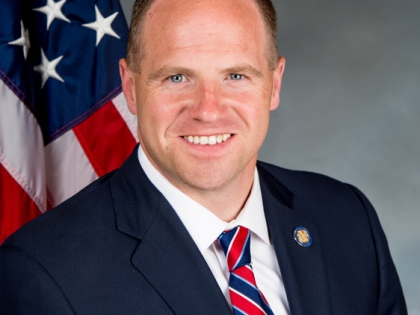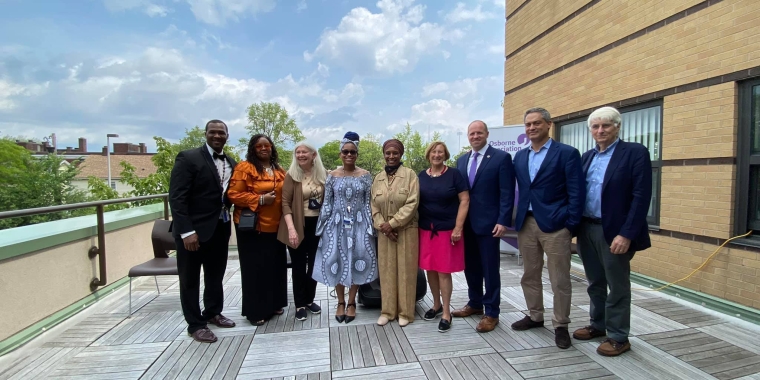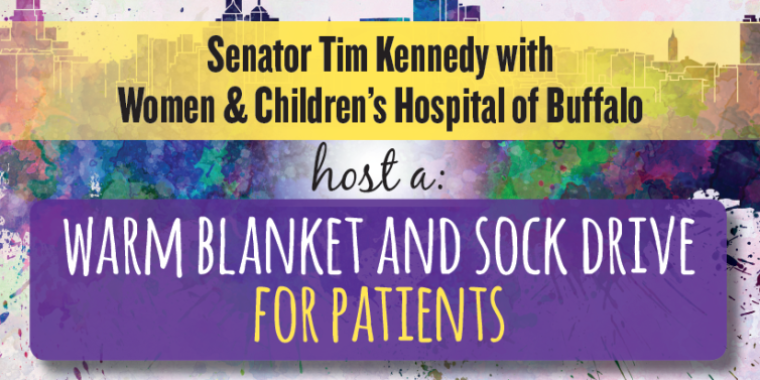
With Funds Running Low, Kennedy Announces $180,000 in NYS Budget for FamilyWorks Buffalo to Keep Program Thriving
July 7, 2021
-
ISSUE:
- incarceration
- Family
- criminal justice

BUFFALO, NY - Senator Tim Kennedy (D-Buffalo) joined Osborne Association President and CEO Elizabeth Gaynes and Community Health Center of Buffalo CEO LaVonne Ansari, PhD to announce that this year’s NYS Budget will provide $180,000 in new funds to support the continued operations of FamilyWorks Buffalo. The initiative, which was created by the Osborne Association and operates out of Community Health Center of Buffalo’s Benwood Ave. headquarters, provides free video visits for families of incarcerated individuals, with video links provided by the NYS Department of Corrections and Community Supervision in 11 New York State prisons.
For many children with incarcerated parents who are often housed far from home, the cost and distance to visit in-person can be insurmountable or make visiting rare. Relationships with family play an integral role in the reintegration process for those who are coming home, and also provide children with a viable, sustainable connection despite their separation. This new funding will ensure that the program has the resources necessary to continue operating, providing families with a link to their loved ones. Recognizing the trauma that having a parent who is incarcerated can have on children, Osborne also provides recreational activities, along with youth leadership and support groups that are designed to destigmatize the shared experience of incarceration. Since launching, FamilyWorks Buffalo has worked with 44 families, and facilitated more than 145 video visits.
“The profound emotional impact on children of incarcerated adults can often be overlooked,” said Senator Kennedy. “It is critical that we do all that we can to ease the stress imposed on children and families affected by incarceration, including by expanding opportunities to communicate in a family-like setting with parents. Children of incarcerated adults should not be forgotten. They should be given every opportunity to thrive, succeed, and build important familial relationships, and with these tools, they can. With this renewed funding, I’m proud that we are providing these families with the resources they need to come out of a traumatic experience with their bonds strengthened.”
“During an especially difficult year when in-person visiting was suspended in the face of COVID, families in Western New York were still able to maintain these vital connections with supported video visiting, which would not have been possible without Senator Kennedy’s tenacious and inclusive support for families,” said Osborne CEO Elizabeth Gaynes.
"Senator Kennedy was the first to champion funding for the FamilyWorks program back in 2019,” said Community Health Center of Buffalo CEO Dr. LaVonne Ansari. “Together we are meeting families where they are, which is vital to those enduring long-term family separations. By having the FamilyWorks Video Visiting program housed at our Buffalo site, we are addressing one of the social drivers that make a difference in a child’s well being - mental health. Thanks to Senator Kennedy for replenishing the financial resources to continue this work.”
“I learned to appreciate many extraordinary people and places in Buffalo when I served in state government,” said Jamie Rubin, chair of Osborne’s Board of Directors, “and now I am delighted to see that the Osborne Association has found a welcoming home in the City of Good Neighbors, where Senator Kennedy and Dr. Ansari recognize the importance of meeting the needs and respecting the rights of children and families affected by incarceration.”
Children of incarcerated adults need tools to express their emotions and to be reassured that they are not going through this traumatic situation alone. FamilyWorks Buffalo builds upon Osborne’s decades of experience. The organization was founded in 1933, and designs, implements, and advocates for solutions that address the damage caused by crime and incarceration. Their work creates opportunities for more than 12,000 individuals every year who have been affected by the criminal justice system, helping them to lead meaningful lives with accountability and self-determination. The organization has a presence in New York City courts, Rikers Island jails, thirty New York State prisons, as well as community sites in Buffalo, New York City and the Hudson Valley.
###



